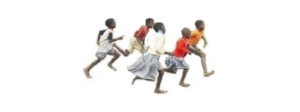Kenya has recorded 62,488 Covid-19 cases and 1,110 deaths. A country of 50 million people, Kenya so far has fortunately not reached a toll as large as countries comparable in size across the world. The government has acted early on, restricting travel and gatherings, mandating mask wearing, closing schools, dining places and setting a curfew. We are worried though, because past weeks have seen highest continuous rise of cases and the country has less than one hundred ventilators and a health system that won’t be able to cope if Covid-19 spreads like in the Global North.
We are especially worried about children and families living in Kenya’s poorest regions – slums and marginalized rural areas. Bamba is one of these impoverished places and there is a fear of Covid-19 eventually spreading and taking its toll, where there is no access at all to intensive care units and ventilators.
There is another fear among the people, that is familiar and normally more associated with droughts – fear of looming hunger. Covid-19 has already hit the economy direly. The poorest people in Bamba, facing harsh climate, with little access to arable land and inputs are predominantly dependent on casual labour and on buying food to survive. The employers, mainly bigger farmers and traders, are tightening their belts and trying to economically survive during an unprecedented economic downturn. The poorest lose employment and can’t count on Western-style social nets, these are just non-existent. There is just no money to buy food in the end, which is devastating. People start skipping meals as food prices rise. This has began to happen and we hope that the economy survives this storm and doesn’t go into a further downward spiral.
For months now children all over the country haven’t attended school (with the small exception some preparing for final grade exams) and virtual learning has only been accessible to those who have the privilege of attending one of a handful of top private schools. As a result, all of Bamba’s children are losing a year of education and have been staying at home, helping around with chores when they should be progressing with a formal education as this remains one of the only routes out of poverty for them.
We hope that the situation will improve and that the economic and social crisis will not deepen. We will keep you updated!

